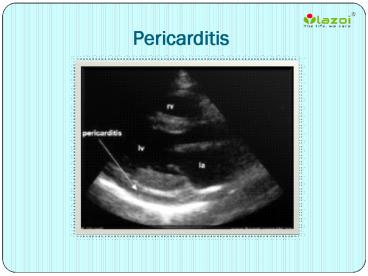Pericarditis: causes, symptoms and treatment
Title:
Pericarditis: causes, symptoms and treatment
Description:
Pericarditis is considered chronic. The sharp chest pain associated with this problem normally occurs when the inflamed or irritated two layers of the pericardium rub against each other. –
Number of Views:110
Title: Pericarditis: causes, symptoms and treatment
1
Pericarditis
2
Pericarditis
- There are many problems related to the heart and
it is very important for people to know about all
these diseases and problems so that they can
prevent them. One such problem is Pericarditis
which is the occurrence of swelling and
irritation on the pericardium, which is thin
sac-like membrane that surrounds your heart.
Pericarditis is a problem which often causes
chest pain and sometimes, other symptoms also
occur. This is normally short lived and a short
lived problem if cured on time. When symptoms
develop more gradually or persist, the
Pericarditis is considered chronic. The sharp
chest pain associated with this problem normally
occurs when the inflamed or irritated two layers
of the pericardium rub against each other.Under
normal circumstances, the two-layered pericardial
sac that surrounds your heart contains a small
amount of lubricating fluid.
3
Pericarditis
Continue
- In Pericarditis,the sac becomes inflamed and the
resulting friction from the inflamed sac leads to
chest pain which becomes a problem for the
patient. Though, finding out the reason as to why
this problem occurred is next to impossible but
most of the doctors have identified the reason
behind this problem to be a viral infection.This
problem can also occur after the patient has
suffered a major heart attack and this is due to
the irritation occurring on the underlying and
damaged muscles of the heart. Moreover, a delayed
form of Pericarditis may occur weeks after a
heart attack or heart surgery because of antibody
formation.This delayed Pericarditis is also
known as Dressler's syndrome which creates a lot
of problems for the patients. Many experts
believe Dressler's syndrome is due to an
autoimmune response or a mistaken inflammatory
response by the body to its own tissues following
the heart and its tissues.
4
Symptoms
- There are two kinds of Pericarditis happening to
people. One is known as acute which only lasts
for a few weeks and another is known as the
chronic one which lasts for more than six months.
If one is suffering from the acute Pericarditis,
the most common symptom are sharp, stabbing chest
pain behind the breastbone or in the left side of
your chest which creates a lot of pain in the
patient. However, some people suffering from the
acute phase of this problem describe their chest
pain as dull, achy or pressure-like instead, and
of varying intensity which tends to create a lot
of problem for them though for short durations.
Also the pain of acute Pericarditis might move to
the left side of the shoulder and neck.It often
intensifies when the patient lie down or inhale
deeply. Coughing,taking a deep breath or
swallowing food also may make the pain worse and
makes this problem also more complicated. Sitting
up and leaning forward can ease the pain.
5
Symptoms
Continue
- At times, it may be difficult to distinguish
pericardial pain from the pain that occurs with a
heart attack.Talking of the chronic phase of
this problem, it is normally associated with
chronic inflammation which further results into
fluid surrounding the heart which in medical
terms is known as pericardial effusion. Some of
the most common kinds of symptoms identified in
people suffering from this problem are - Shortness of breath when one reclines
- Sharp or piercing pain in the chest and
especially spreading towards the center and left
side of the chest - Having mild and low grade fever
- Sudden swelling in the abdomen and leg of the
patient - Persistent dry cough
6
Treatments
- The treatment in viral or idiopathic
pericarditis is with aspirin, or non-steroidal
anti-inflammatory drugs (NSAIDs such as
ibuprofen). Colchicine may be added to the
above. Severe cases may require
Pericardiocentesis to treat pericardial
effusion/tamponade antibiotics to treat
tuberculosis or other bacterial
causes. Steroids are used in acute pericarditis
but are not favored because they increase the
chance of recurrent pericarditis. in rare cases,
surgery in cases of constrictive pericarditis,
pericardiectomy
7
CONNECT WITH US
- Logon to
- www.lazoi.com
- Like us on Facebook
- https//www.facebook.com/LazoiTheLife
- Follow us on Twitter
- https//www.twitter.com/lazoithelife
- Follow us on Pinterest
- https//www.in.pinterest.com/lazoithelife































